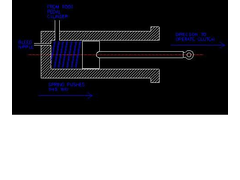Moorron
|
 posted on 10/12/08 at 12:45 PM posted on 10/12/08 at 12:45 PM |

|
|
Hydraulic clutch
Morning fellow locosters.
I need some help understanding brake/clutch hydraulics as I am currently modifying the one fitted to my BEC as i am fitting a new engine. The last
engine was a CBR1000F and the last owner had used a hydraulic setup on the clutch which I want to keep and adapt it to the new ZX12R engine. The old
setup was simple; a foot pedal connected to a master cylinder with a single port, this cylinder has a small reservoir connected to it. It then passed
along the braided pipe to the engine mounted cylinder. On the old engine it then had a long steel rod which passed thru the engine casing to the
clutch. It worked great.
However, the new engine has a cable clutch and links to the actuating bar on the outside of the engine. This is where I am going to connect the
cylinder to. All very simple but what I donít like is the engine mounted cylinder has an internal spring which pushes outwards, and is very strong
which makes me think it will put too much pressure on the clutch arm when i am not using it and cause the clutch to slip (it will be like driving all
the time and resting your foot on the clutch pedal). This didnít seem to be a problem on the old engine, but just doesnít seem right to me. Can I
dismantle the cylinder and remove this spring? Do I need to?
What I understand is when the clutch pedal is released the spring in the pedal mounted cylinder pushes the pedal back to its resting position, the
clutch springs also help this. The Engine mounted cylinder retracts from the clutch springs pushing the rod back AND the vacuum created by the
hydraulic fluid returning to the pedal cylinder. Is this right? I donít want to remove the spring and find it was there for another purpose like
keeping the fluid from entering the reservoir?
Hope you can understand my description and concerns.
Cheers
Andy
Sorry about my spelling, im an engineer and only work in numbers.
|
|
|
|
|
britishtrident
|
| posted on 10/12/08 at 01:26 PM |

|
|
The push back of the slave cylinder piston is entirely done by the clutch pressure plate.
A light spring inside slave cylinder is normal, if you don't have the clutch won't be self adjusting and may occaisional need a double
pump on the pedal to work.
[Edited on 10/12/08 by britishtrident]
|
|
|
dinosaurjuice
|
| posted on 10/12/08 at 01:32 PM |

|
|
if ive got what your saying right, the spring is compressed when the clutch is disengaged?
this might be some gadget for improving the bite point, i.e spreading it out to make it less snappy. if adjusted correctly the spring wont be under
compression when clutch is engaged and therefore wont cause slip.
any chance you could post some pics?
HTH
will
|
|
|
Moorron
|
| posted on 10/12/08 at 02:02 PM |

|
|
 
clutch d
sorry for the bad drawings, the rod moves to the right to operate the clutch. When it isnt used it needs to return and move to the left but the spring
is fighting it.
Sorry about my spelling, im an engineer and only work in numbers.
|
|
|
Richard Quinn
|
| posted on 10/12/08 at 05:08 PM |

|
|
Was the spring in compression at rest in the old set up or was it there just to stop any over travel of the returning piston? If the enthusiastic
clutch springs threw the piston all the way back to the end of its travel would the piston then effectively block the fluid inlet?
[Edited on 10/12/08 by Richard Quinn]
|
|
|
Moorron
|
| posted on 10/12/08 at 09:26 PM |

|
|
i cant check if the original setup allowed the spring to compress completly. Ive took it apart tonight and if i remove the spring it will block the
inlet of fluid, so now im going to have to use it with it in and see what happens. 
Sorry about my spelling, im an engineer and only work in numbers.
|
|
|













